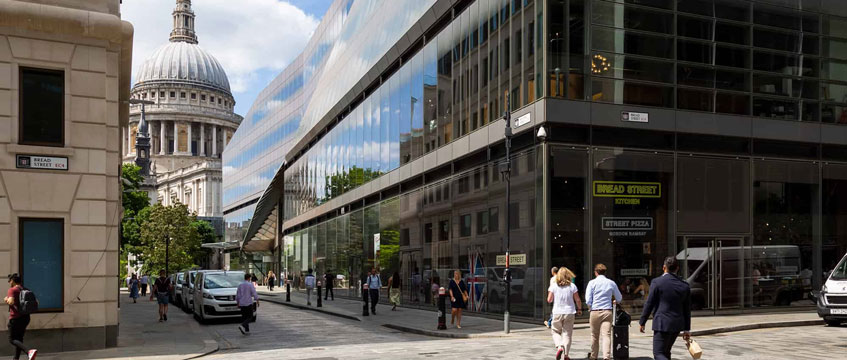Landlords look to leisure to fill vacant Square Mile sites
News
by
Tim Burke and Chanté Bohitige
A plan to turn an HSBC bank on Fleet Street that has sat vacant for two years into a mini-golf venue is the latest example of leisure bringing hope to landlords in the City of London.
If approved, proposals filed with the City of London Corporation would see the ground floor and basement of 165 Fleet Street, EC4, into a noodle bar with mini-golf and 10-pin bowling.
A planning statement from Beasley Dickson Architects said keeping the space as commercial class E was “considered not viable in light of the current retail environment”, adding that the ground floor was “proving challenging to market, particularly given the size and as there are a number of other vacant commercial spaces along Fleet Street”.
A plan to turn an HSBC bank on Fleet Street that has sat vacant for two years into a mini-golf venue is the latest example of leisure bringing hope to landlords in the City of London.
If approved, proposals filed with the City of London Corporation would see the ground floor and basement of 165 Fleet Street, EC4, into a noodle bar with mini-golf and 10-pin bowling.
A planning statement from Beasley Dickson Architects said keeping the space as commercial class E was “considered not viable in light of the current retail environment”, adding that the ground floor was “proving challenging to market, particularly given the size and as there are a number of other vacant commercial spaces along Fleet Street”.
The application comes after Landsec was granted permission to turn more of its retail and office block at One New Change, EC4, into leisure space. By the end of this month the lower ground floor of the building will be largely vacant, and Landsec wants to convert around 21,888 sq ft across seven units into a “competitive socialising” offering combining food and games such as golf or bowling.
Approving that plan, the City corporation’s planning officer said: “The competitive socialising offering would provide a seven-day offering and alternative setting which would help diversify the City to attract new visitors from further afield to this area.” The building is already home to the F1Arcade racing simulator.
Meanwhile, indoor games and entertainment provider Roxy Ball Room is set to open its first London site at AmTrust Europe’s 33 St Mary Axe, EC3, in space that was once home to retailer TK Maxx but which has been empty since 2022.
These and other deals underscore a shift in the Square Mile and the opportunities it opens for landlords with empty space in their properties. Thomas Rose at retail, leisure and restaurant agency P-Three said the growth of the “experience economy” was picking up pace, and that changes in the real estate market have encouraged activity.
“In the last couple of years, two key things have happened,” Rose said. “Firstly there has been a huge growth in consumer spending on leisure concepts; consumer demand is significant and growing, albeit only for the best concepts. This has pushed entrepreneurial operators to establish new concepts driving demand for space, which in turn has created competitive bidding and pushed up rents for landlords in the best locations.
“Secondly, there has been a re-basing of rents across retail and secondary office space, which means the gap is now closing between these uses and leisure space. Aligned to this of course is tenant mix strategy; landlords want to add more leisure to their destinations to extend hours and drive footfall. Canary Wharf have done a great job at adding more leisure to help curate a place which is more than just offices. The same is being seen in the City. Our client, F1Arcade, only ever wanted to launch their first site in the Square Mile given the excellent transport connections and access to both social and lucrative corporate consumers. This is a trend which is likely to continue in the immediate future.”
The trend plays into the City of London Corporation’s Destination City initiative, which envisions the Square Mile as a leisure destination for visitors, workers and residents. The scheme was the brainchild of Chris Hayward, the corporation’s policy chairman.
“During Covid, our SMEs were hit really badly,” Hayward told EG. “It seemed to me when I took over this role two years ago that the first job was to get new footfall coming into the City, spending new money. And that meant really reimagining the Square Mile as something that wasn’t just a business City, even though that’s its core purpose and core value, but which also could be a seven-day-a-week tourist destination as well. That would never be possible 20 years ago.”
An independent review into its first two years is set to be published soon. Hayward promises more change. “It started off as something which was about getting footfall and that was it,” he said. “But I soon found that when I talked to 20 of my colleagues and said, ‘What do you think Destination City is?’, I got 20 different answers. I want to focus it more. I also want to make sure that it encapsulates the sorts of businesses we want to be attracting. It needs to be more targeted more across all our various demographics, all our various groupings, and not just events and tourism.”











